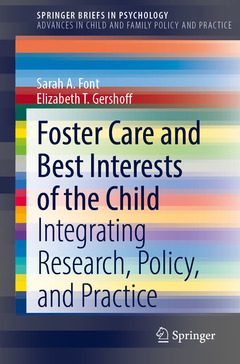Description
Foster Care and Best Interests of the Child, 1st ed. 2020
Integrating Research, Policy, and Practice
Advances in Child and Family Policy and Practice Series
Authors: Font Sarah A., Gershoff Elizabeth T.
Language: English
Subjects for Foster Care and Best Interests of the Child:
Keywords
Adoption and foster care; Child maltreatment and foster care; Child protection and foster care; Child well-being and foster care; Class biases and foster care; Culture and foster care; Emotional health and foster care; Family preservation and foster care; Family reunification and foster care; Foster care policies and practices; Kinship placements and foster care; Legal parameters and foster care placement; Mental health and foster care; Nonrelative placements and foster care; Parental rights and foster care; Racial biases and foster care; Safety; permanency; & well-being goals of foster care; Siblings and foster care; Social policy and foster care; Social work and foster care
58.01 €
In Print (Delivery period: 15 days).
Add to cart103 p. · 15.5x23.5 cm · Paperback
Description
/li>Contents
/li>Biography
/li>Comment
/li>
This brief examines the U.S. foster care system and seeks to explain why the foster care system functions as it does and how it can be improved to serve the best interest of children. It defines and evaluates key challenges that undermine child safety and well-being in the current foster care system. Chapters highlight the competing values and priorities of the system as well as the pros and cons for the use of foster care. In addition, chapters assess whether the performance objectives in which states are evaluated by the federal government are sufficient to achieve positive health and well-being outcomes for children who experience foster care. Finally, it offers recommendations for improving the system and maximizing positive outcomes.
Topics featured in this brief include:
- Legal aspects of removal and placement of children in foster care.
- The effectiveness of prior efforts to reform foster care.
- The regulation and quality of foster homes.
- Support for youth aging out of the foster care system.
- Racial and ethnic disparities in the foster care system.
Foster Care and the Best Interests of the Child is a must-have resource for policy makers and related professionals, graduate students, and researchers in child and school psychology, family studies, public health, social work, law/criminal justice, and sociology.
Sarah A. Font, Ph.D., is an Assistant Professor at Pennsylvania State University in the Department of Sociology and Criminology and is a faculty member of the Child Maltreatment Solutions Network. Her research focuses on how the child protective services and foster care systems work to further or undermine child well-being. She holds a Ph.D. in Social Welfare from the University of Wisconsin-Madison.
Elizabeth T. Gershoff, Ph.D., is a Professor of Human Development and Family Sciences and is Associate Director of the Population Research Center, both at the University of Texas at Austin. She has published extensively on the topic of physical punishment and is an internationally recognized expert on the effects that physical punishment by parents or by school personnel has on children. She earned her Ph.D. in Child Development from the University of Texas at Austin.
Examines the theory, policy, practice, and empirical research behind the U.S. foster care system
Questions core values and objectives of the foster care system
Discusses competing values and priorities of the system (e.g., political, economic, and legal incentives) for and against the use of foster care
Describes and evaluates key challenges that undermine child safety and well-being in the current foster care system
These books may interest you

Children in Foster Care 48.88 €

Handbook of Foster Youth 129.87 €

Handbook of Foster Youth 305.19 €

